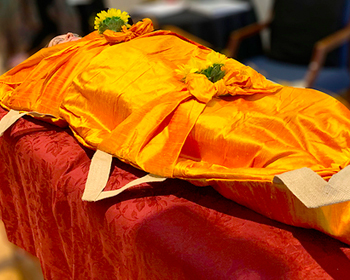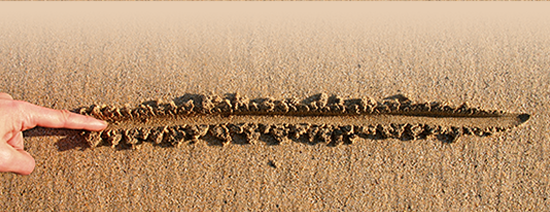| TOOLBOX TIPS |
 |
When dealing with a client who may have experienced the death of someone with whom they had a difficult relationship, encourage them to write a letter to the deceased person. |
| First, have them focus on a positive attribute they received from that individual. It may be challenging, but somewhere deep in their memory there may be a positive moment they remember. Next, have the client write about taking all the disappointments, criticisms, and negative interactions they experienced and bundle them in a package. Lastly, have them write freely about what to do with that package. Inspire them to write from their heart instead of their mind. There is no right or wrong way to deal with those bundled up hurts. Whatever they do with that package will lessen the hurt they experienced with the deceased. Writing from their heart creates a powerful soul communication with the deceased.
– Mary Lemons
|
|
| SHARING SOURCES |
| But What Should I Wear to My Own Funeral? |
| Shrouds have been part of human death rituals for thousands of years. Some- times called “winding sheets” because they may simply be sheets that are wrapped around the deceased before burial, shrouds appear in the funereal customs of cultures and religious prac-tices all over the world. Use of shrouds decreased in western cultures in the |
 |
| 20th Century, but with “green” burial gaining currency, there has been a resurgence of interest in their use. |
|
|
 |
|
|
ASK INELDA
|
 |
| I have a large family and imagine someone asking me soon to act as their doula. Can I use the time aiding my relative towards my certification? —G. |
| INELDA: We ask that you not include immediate family, close friends, anyone you would consider in your inner circle, for case studies towards your certification. A hall-mark of the doula approach is the ability to engage with clients as a compassionate but objective presence. When you work with people that you share dynamics and attach-ments with, it is harder to maintain that objective presence. For example, if you need to advocate for the dying person with loved ones who don’t agree, being a family member or close friend can cause hard feelings. Also, the conversations that we have with people that we are not intimately connected to can be deeper because we don’t have to worry about the impact on the relationship or our relationships with other family or friends. We want you to have experiences where you are specifically in the objective doula role for your certification cases. If you are unsure whether or not a case will allow you to remain objective, contact us for further guidance. |
| Please submit questions to [email protected] |
|
| Self-Care Prescription |
| As human beings, creating and enforcing boundaries is foundational to taking care of ourselves. Without boundaries, we can easily lose track of where we begin and end. When we set personal boundaries, we are engaging in an act of self-love that, in its truest form honors the space between ourselves and others. It honors the spiritual exchange between beings. |
| In the many roles in my life – as a daughter, sister, friend, lover, teacher, nurse, doula, instructor, child of the universe, and student – I have learned that the most important self-care tool I can ever work on are my boundaries. Similarly, the benefits I’ve gained from creating and enforcing personal boundaries have been powerful contributors to my professional and personal evolution. It is essential to my physical, spiritual, and emotional health that I know my own limitations. READ MORE
– Nicole Heidbreder
|
 |
|

